
Gayatri Chakravorty Spivak is an Indian scholar, literary theorist, and feminist critic. She is a University Professor at Columbia University and a founding member of the establishment's Institute for Comparative Literature and Society.

Mahasweta Devi was an Indian writer in Bengali and an activist. Her notable literary works include Hajar Churashir Maa, Rudali, and Aranyer Adhikar. She was a leftist who worked for the rights and empowerment of the tribal people of West Bengal, Bihar, Madhya Pradesh and Chhattisgarh states of India. She was honoured with various literary awards such as the Sahitya Akademi Award, Jnanpith Award and Ramon Magsaysay Award along with India's civilian awards Padma Shri and Padma Vibhushan.
Chuni Kotal was a Dalit Adivasi of Lodha Shabar tribe, a Scheduled Tribes of India, who in 1985 became the first woman graduate among the Lodha Shabars.

Bijon Bhattacharya was an Indian theatre and film actor from West Bengal. He was an eminent playwright and dramatist.
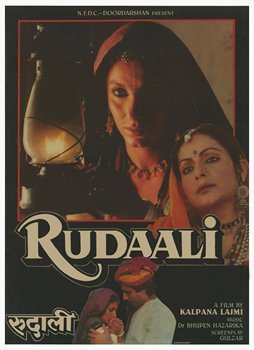
Rudaali is a 1993 Indian Hindi-language drama film directed by Kalpana Lajmi, written by Lajmi and Gulzar and based on a 1979 short story of the same name by Bengali author Mahasweta Devi. Set in a small village in Rajasthan, the film stars Dimple Kapadia as Shanichari, a lonely and hardened woman who, despite a lifetime of misfortune and abandonment, is unable to express grief through crying and is challenged with a new job as a professional mourner. Raakhee, Raj Babbar, and Amjad Khan appear in supporting roles. Produced by the National Film Development Corporation of India and Doordarshan, the film was labelled part of India's neo-realist parallel cinema, but it employed several of the common elements of mainstream Hindi cinema, including songs composed by Bhupen Hazarika.
Jyotirmoyee Devi (1894–1988) was an Indian writer in the early twentieth century. She wrote predominantly about women in the Rajasthan of her childhood and in what is now West Bengal at the time of Partition.
The Sabar people are one of the Adivasi of Munda ethnic group tribe who live mainly in Odisha and West Bengal. During the colonial period, they were classed as one of the 'criminal tribes' under Criminal Tribes Act 1871, and suffer from social stigma and ostracism in modern times.
Mahasweta Ray is an Indian actress and television personality who is known for her work in Odia films and soap operas. Her numerous accolades include record 8 Odisha State Film Awards.

Mrinal Chatterjee is an Indian academic and author. He heads the Indian Institute of Dhenkanal. He has authored five academic books on media studies in Odia, including History of Journalism in Odisha and Glossary of Terms for Media Persons. His has authored ten novels and seven short story collections in Odia, including Jagate Thiba Jate Dina published (2010), Kandhei (2013), Eka Sundar Chandini Ratire (2016), Yamraj Chutire (2015), Yamraj Number 5003 (2016), which is translated into Assamese, and a series of columns in Odia
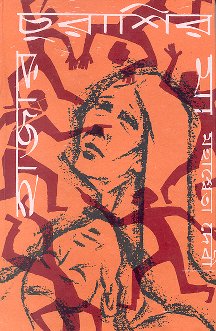
Hajar Churashir Maa is a 1974 Bengali novel written by Ramon Magsaysay Award winner Mahasweta Devi. It was written in 1974 on the backdrop of the Naxalite revolution in the Seventies.

Nalini Bala Devi was an Indian writer and poet of Assamese literature, known for nationalistic as well as mystical poetry. She was awarded the Padma Shri by the Government of India in 1957 for her contribution to literature, and 1968 she won the Sahitya Akademi Award given by Sahitya Akademi for her poetry collection Alakananda. She is the first woman Assamese poet to be awarded with Padma Shri and the first lady to the chair the Assam Sahitya Sabha.
Manish Ghatak was an Indian poet and novelist writin in Bengali.

Anila Amrutlal Dalal is Gujarati critic and translator.
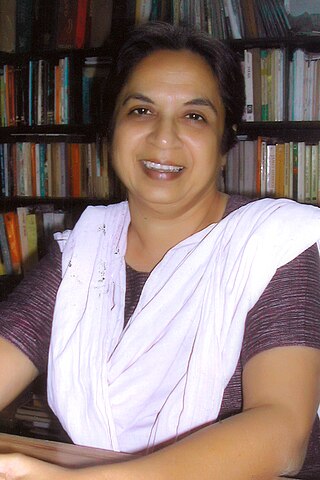
Himanshi Indulal Shelat is a Gujarati author from Gujarat, India. She received Sahitya Akademi Award for Gujarati in 1996 for her short stories collection Andhari Galima Safed Tapakan (1992).
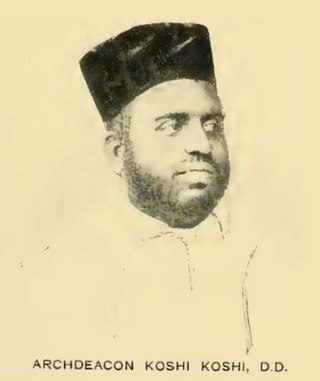
Koshy Koshy also spelled as Koshi Koshi (1825–1899) was an Indian Anglican priest and Malayalam novelist.
Ullas is a Bengali social drama film directed by Ishwar Chakraborty and produced by Sankar Sarkar. This film was based on three short stories of Mahasweta Devi namely Daur, Mahadu Ekti Rupkatha and Anno Aranya. This movie was released on 29 June 2012 under the banner of R.N.R. Enterprise. Writer Mahasweta Devi acted in the film in the role of Basuli goddess.

Chand Usmani was an Indian actress in Hindi films from the 1950s to the late 1980s. She won the 1971 Filmfare Award for Best Supporting Actress. She is best remembered for playing self-sacrificing wives and mothers.
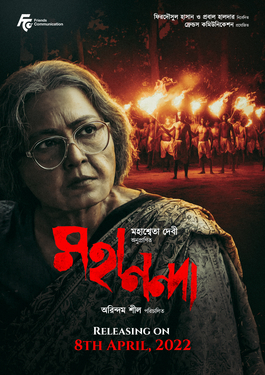
Mahananda is a 2022 Indian Bengali-language biographical film directed by Arindam Sil. The film is produced by Firdausul Hasan and Probal Halder under the banner of Friends Communication. The film is based on the life and works of the eminent writer and socio-political activist Mahasweta Devi. The film stars Gargi Roychowdhury in the title role.
Sunil Naliyath is a Malayalam language writer and translator from Kerala, India. He translated many noted literary works in Bengali to Malayalam. He received many awards including the Kerala Sahitya Akademi Award for Translation in 2014 and the Sahitya Akademi Award for Translation in 2022.












